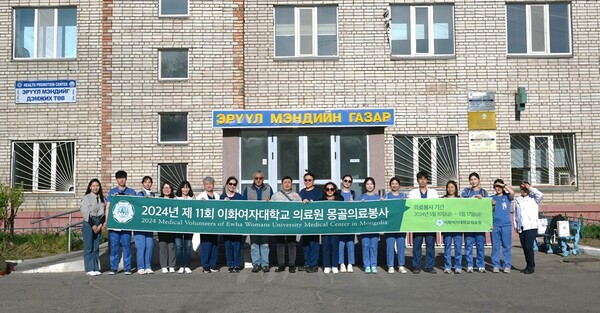The Ewha Womans University Medical Center (Director Kyung-ha Yoo) Mongolian Medical Volunteer Group conducted medical service in Mongolia from May 10 to 17 for 7 nights and 8 days.
Over 10,000 patients (12,307 people) have received treatment through Mongolian medical services that have been carried out for 14 years since 2011. The Mongolian medical service team has been treating Mongolian patients by traveling around Mongolia for 11 years, excluding the three years from 2020 to 2022 when medical services were suspended due to COVID-19.
We heard about the meaning and aspirations of Mongolian medical service from Professor Kang Kyung-ho, head of the International Medical Service Group (surgery department) and head of the Mongolian Medical Service Group at Ewha Medical Center.
– The number of patients treated in Mongolia through medical services conducted in two regions, Darkhan, Oul Province, Mongolia in May this year and Bayangol District, Ulaanbaatar, exceeded 10,000. What is the significance and outcome?
The symbolic significance of surpassing 10,000 people is significant, but I would like to give greater meaning to the fact that we have continued meaningful activities for 14 years. Mongolian medical service is an activity that has put into practice the spirit of love, dedication, and service that our Ewha Medical Center has pursued since the establishment of Bogu Women’s Hospital, the first modern women’s hospital and women’s medical education institution in Korea in 1887. Above all, I think the greatest achievement is that through medical service, we have laid the foundation for continuing larger and more meaningful activities in the future.
-Why did Ewha Medical Center provide medical services in Mongolia in particular?
It was in August 2011 that we began volunteering in the Argalant region at the invitation of First Lady H. Bolormaa, who was receiving treatment at the Ewha Women’s Cancer Hospital. We signed a business agreement with the Mongolian National Cancer Center and UB Songdo Hospital in Ulaanbaatar to conduct volunteer medical services in the local area, and 14 years have passed since then.
-What diseases do Mongolians have a lot of?
Mongolians traditionally ate fatty foods because they needed meat to survive the cold winters and do the arduous nomadic work, but now they no longer ride horses and their activity levels have decreased, leading to an increase in the obese population. This is also why there is a high incidence of cardiovascular disease and degenerative osteoarthritis. In addition, the habit of drinking high-proof vodka to maintain body temperature in the cold winter still persists, exposing them to diseases such as chronic pancreatitis and liver cirrhosis.
Vaccinations are not smooth, and there are frequent cases of repeated use of disposable medical devices such as syringes, resulting in a high incidence of hepatitis and liver cancer. Education and support are urgently needed.
-I heard that they are considering supporting hepatitis vaccination in Mongolia in 2025, the 15th anniversary.
Professor Min Seok-gi of the Department of Hepatobiliary and Pancreatic Surgery at Seoul National University Hospital, who participated in this medical service, gave me an idea after seeing many patients with infections and liver cancer while treating patients in Mongolia. After investigating, I found out that Mongolia has one of the highest rates of hepatitis A, B, and C infections in the world, and Mongolia considers it a national public health crisis.
Our country has world-class technology in hepatitis vaccine manufacturing, so we will try to find ways for these manufacturers to participate in meaningful volunteer activities.
-What are your ambitions as the head of the international medical business unit?
The Je Medical Business Division will seek various methods, both online and offline, such as overseas hospital consulting, medical staff training, and patient recruitment, to enable Ewha Medical Center to play a leading role on the world stage by utilizing the best resources it has in the spirit of coexistence, empathy, and harmony, which are the values of Ewha Medical Center.

Source: www.nextdaily.co.kr


